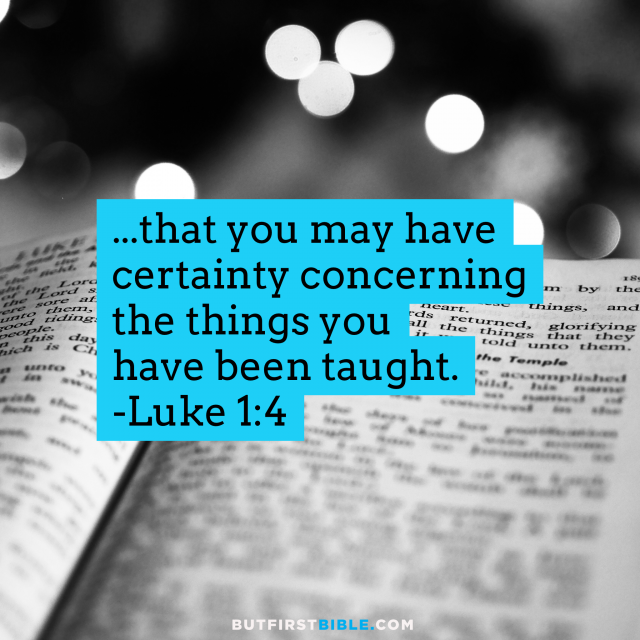
Welcome to the “But first, Bible” daily devotional podcast with Dave Miers.
Our readings for today are Deuteronomy 31-32 and Luke 1:1-23.
Thank you for following along with this podcast! There have been over 20,000 downloads this year, and I’m always encouraged to hear of the way that this podcast is helping people to develop a bible reading habit of their own.
Today, we begin a new book, the Gospel According to Luke. This is the perfect time to encourage others to join in with this reading plan, or perhaps you know of others who have fallen so far behind that they’ve effectively quit… encourage them to join in again! Take a moment to send a message to someone, or share via social media.
The opening paragraph of Luke’s gospel gives us a good insight into HOW and WHY Luke wrote this account of Jesus Christ.
Let me read that opening paragraph,
Luke 1:1–4
[1] Inasmuch as many have undertaken to compile a narrative of the things that have been accomplished among us, [2] just as those who from the beginning were eyewitnesses and ministers of the word have delivered them to us, [3] it seemed good to me also, having followed all things closely for some time past, to write an orderly account for you, most excellent Theophilus, [4] that you may have certainty concerning the things you have been taught. (ESV)
First, the HOW of writing Luke’s Gospel.
In verse 1 we learn that others have compiled a narrative of the things that have been accomplished among us. The ’things’ is referring to Jesus, that he has come, and that he has come in fulfilment of God’s promises from the Old Testament.
We know that by the time that Luke wrote his gospel that the Gospel According to Mark was already in circulation. As we read through Luke, we’ll see sections that are very similar to Mark. But we will see other things that are unique to Luke.
How did Luke find these things out? Luke – who we read elsewhere was a physician – was also a skilled historian. And so verse 2 shows us that he has learnt more about Jesus by asking ministers of the word and other eyewitnesses about what they have seen.
HOW? Luke looks at other narratives and talks to eyewitnesses.
Second, the WHY of writing Luke’s Gospel.
In verse 3 we learn that Luke has compiled this orderly account for a fella named Theophilus. We don’t know much about him, but ‘most excellent’ shows he’s some type of official. Perhaps Theophilus has commissioned Luke to compile this gospel account.
Regardless, verse 4 shows us that Luke wants Theophilus to “have certainty concerning the things [he’s] been taught”. Theo already knows things about Jesus, and Luke wants him to be certain.
I trust that as we read this gospel account, we can be all the more certain of all that has been accomplished in and through Jesus. Knowing that Luke has spoken to eyewitness, who were there when Jesus was born, who saw Jesus grow up, who witness his miracles, who learnt from his teaching, who saw him die on the cross, and who saw him after his resurrection… this ought to give us great certainty in the things that we will be reading together.
HOW? Luke looks at other narratives and talks to eyewitnesses.
WHY? Luke wants us to be certain about Jesus.
Until tomorrow, keep trusting Jesus.
